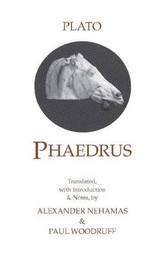
|
Phaedrus
Paperback / softback
Main Details
| Title |
Phaedrus
|
| Authors and Contributors |
By (author) Plato
|
|
Translated by Steven Scully
|
|
Translated by Paul Woodruff
|
| Series | Hackett Classics |
|---|
| Physical Properties |
| Format:Paperback / softback | | Pages:144 | | Dimensions(mm): Height 215,Width 139 |
|
| Category/Genre | Literary essays
Western philosophy - Ancient to c 500 |
|---|
| ISBN/Barcode |
9780872202207
|
| Classifications | Dewey:184 |
|---|
| Audience | |
|---|
|
Publishing Details |
| Publisher |
Hackett Publishing Co, Inc
|
| Imprint |
Hackett Publishing Co, Inc
|
| Publication Date |
15 March 1995 |
| Publication Country |
United States
|
Description
This is an English translation of one of Plato's least political dialogues of Socrates and Phaedrus discussing many themes: the art and practice of rhetoric, love, reincarnation, and the soul. It includes an introduction, notes, glossary, appendices, and an interpretive essay and introduction. Also included are rarely seen illustrations, stone carvings, and vase paintings. Focus Philosophical Library translations are close to and are non-interpretative of the original text, with the notes and a glossary intending to provide the reader with some sense of the terms and the concepts as they were understood by Plato's immediate audience.
Author Biography
Alexander Nehamas is Professor of Philosophy, Princeton University. Paul Woodruff is Professor of Philosophy, University of Texas at Austin.
ReviewsA superb translation that captures the rhetorical brilliance of the Greek. . . . The translation is faithful in the very best sense: it reflects both the meaning and the beauty of the Greek text. . . . The footnotes are always helpful, never obtrusive. A one-page outline is useful since there are no editorial additions to mark major divisions in the dialogue. An appendix containing fragments of early Greek love poetry helps the reader appreciate the rich, and perhaps elusive, meaning of eros. . . . The entire Introduction is crisply written, and the authors' erudition shines throughout, without a trace of pedantry. . . . this is an excellent book that deservedly should find wide circulation for many years to come. --Tim Mahoney, University of Texas at Arlington
|